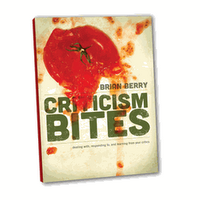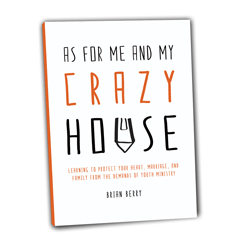Well, the “criticism” on Criticism Bites is slowly beginning to come in through book reviews. This one- pretty much doesn’t count as criticism cuz he liked it a lot evidently. Anyway, it came from Matt Murphy on his blog.
Here’s what he wrote:
Brian Berry delves into a task that is often difficult for new professionals, especially youth workers to grasp. Brian nails the concept of criticism as he wrestles with the reasons why criticism hurts, then helps us understand how to cope with criticism and respond biblically. The sooner you grasp the concepts in this book, the better off you and your minstry will be.
Being able to understand criticism helps build a stronger ministry and keeps the leader from loosing their mind! This book should be in leadership primer classes as it aptly explores themes around criticism and explores what is and what isn’t the readers responsibility.
I highly recommend this book to anyone who has dealt with criticism and is in ministry. (even not in ministry). I read this book through in one sitting it was so good.
If you’ve read the book and want to post your thoughts- critical or otherwise, I’d be honored to shed some light on them here. Feel free to add your own comments to this post or go ahead and write a post and mention it on twitter, facebook, or send up a flare or something and I’ll try to give you a shout out.
Also, if you’re headed to the simply youth ministry conference this weekend, I’ll be there presenting on the subject a couple of times on Sunday. Come find me and we can chat it up.


 Husband. Dad to 5. Student Ministry Pastor. Follower of Jesus. Yatta yatta.
Husband. Dad to 5. Student Ministry Pastor. Follower of Jesus. Yatta yatta.



Recent Comments